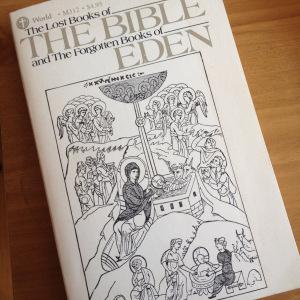As someone always interested in origins, I reflect on how I’ve ended up the way I have.I mean, who plans to end up a Bibles editor?In the grand scheme of a universe with a sense of humor, it’s an odd job.I grew up reading the Bible, but lots of people do.Most of them end up with ordinary people jobs.Obviously, working on a doctorate in the field is admittedly strange, but then, my interests have always been to get to the truth.The other day I spotted a book on my shelf—the book that arguably started it all.The Lost Books of the Bible and The Forgotten Books of Eden.These days I would recognize this for what it is, a cheap reprint of a book published quite some time ago (1926 and 1927).No “value added content.”Just a reprint.But why did this book have such influence?

It was the first time I’d realized—and growing up in poverty with parents lacking college educations you have to teach yourself a lot—that there were other books about as old as the Bible.The idea fascinated me.Somehow my fundamentalist upbringing had convinced me the Bible was the first book ever written—after all, its author was God and how much more primordial can you get?Now this particular book (Lost Books of the Bible etc.) contains some apocryphal Gospels.Not having a strong grasp on the concept of canon, I wondered why these books had been excluded, or, to use the title conceit, “lost” and “forgotten.”In college I would learn about the canonical process.I’d hear more about it in seminary.There I would learn that even older sources existed.In the pre-internet days, in a rural town without so much as a public library, how would you find out about such things?
Helmer Ringgren’s Israelite Religion captured my imagination in seminary.Even there, however, nobody on the faculty seemed to know much about what had come before the Bible.Harrell Beck told us of ancient Egypt in our classes, but clearly there were further depths to plumb.I learned about James Pritchard’s Ancient Near Eastern Texts, which I bought at the Harvard Divinity School bookstore.Other texts went back beyond Holy Writ.Just how far would have to wait until the University of Edinburgh.I sometimes wonder if I might’ve taken a different turn here or there had anyone been able to answer my young, unformulated questions about the origins of the Bible and other ancient books.Now we just have to ask the internet.
